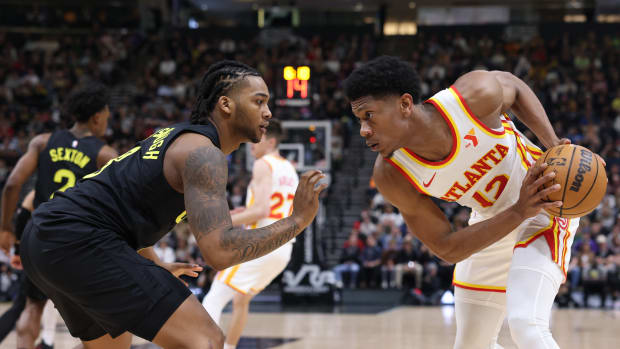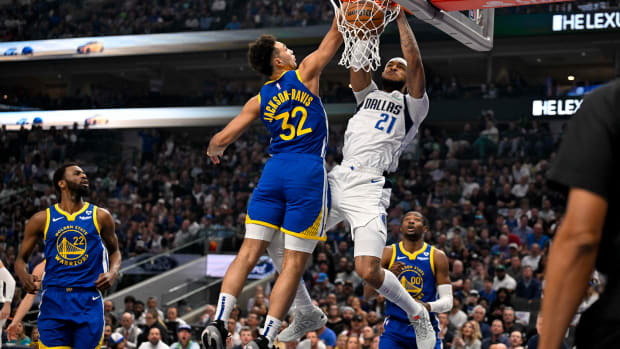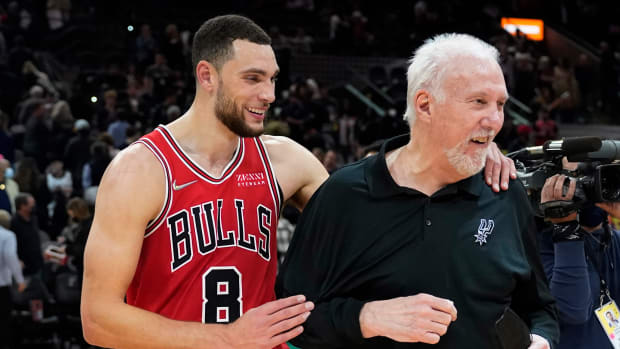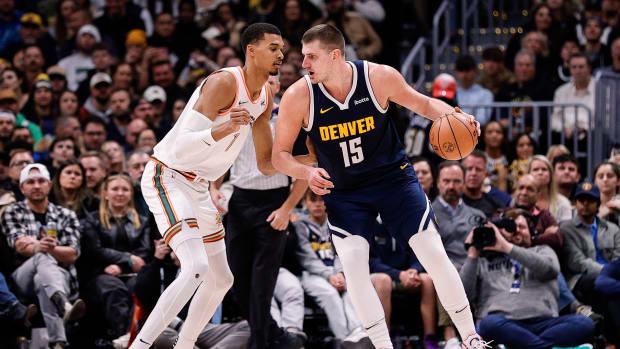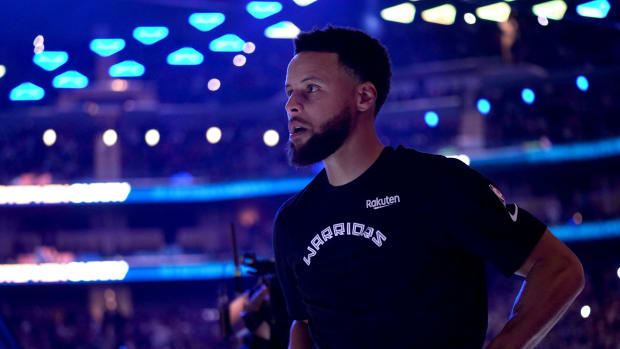Anthony Davis Is Just the Start of the Lakers' Contender Transformation
The trade preferences of Anthony Davis were a matter of public record, and now a manifested reality. After months of posturing and negotiation on all sides, New Orleans has agreed in principle to a deal to send Davis to the Lakers, giving the discontented superstar exactly what he wanted. In exchange, according to ESPN’s Adrian Wojnarowski, the Pelicans will receive Brandon Ingram, Lonzo Ball, Josh Hart, the No. 4 pick in the 2019 draft, a 2021 first-round pick (protected through the top eight) and a wholly unprotected 2024 first-round pick. In addition, the Pelicans will have the right to swap first-round picks with the Lakers in 2023 and 2025.
Reaching this conclusion took the firing of Pelicans’ general manager Dell Demps, the resignation of Lakers' president Magic Johnson and the incidental sabotage of both franchises over the final months of the season. There were reported assurances that the Pelicans, who felt as if they were held hostage, were loathe to do business with the Lakers. There were plausible challengers in the market for Davis, though managed and deflated by his agent, Rich Paul. “They can trade for him,” Paul told Sports Illustrated of suitors like the Celtics, “but it’ll be for one year.” The whims of stars matter. The Lakers could afford to trade for Davis because he wants to be there, which mitigates the risk of his free agency a year from now.
There remains the option for Davis to sign an extension with the Lakers, whether based on his current contract or a renegotiated one, though Chris Haynes of Yahoo! Sports has reported he will not. Even after a prolonged trade saga, there is no need to rush. The Lakers are clearly invested in Davis, to the amount of three prospects and three first-round picks. Now it’s up to Davis to decide if what he thought he wanted measures. In concept, the Lakers are as glamorous as enterprises come—a storied franchise in the NBA’s flagship market led by LeBron James. Look closer and you’ll find a team that goes to incredible lengths to get in its own way, to the point of nearly blowing this deal through the depths of their dysfunction.
Ultimately, they didn’t—and maybe that’s the point. Things just seem to happen for the Lakers, for no other reason than the fact that they’re the Lakers. Enough people in and around the basketball world believe in the franchise’s mystique as to make it real—including Davis and his agent. Forget that the Lakers just fired one head coach only to fumble the hiring of the next. Pay no mind to the roster, barren for the moment aside from James and Kyle Kuzma. This is an organization that tied its fortune to chasing stars, and landed two of the biggest in consecutive summers. There is a certain method to the opportunity the Lakers have created (as evidenced by the one-year deals given to Rajon Rondo, Kentavious Caldwell-Pope and JaVale McGee, among others, last summer), and it worked, more or less. Why it worked is more complex—having to do more with the timing of Davis’s trade demand, the improbability of the Lakers scoring the No. 4 pick and the fates of other franchises they had no bearing over.
The rest of the NBA will have to contend with the result. James and Davis are close to a dream pairing: a brilliant, ball-dominant creator aging into a different phase of his career and a skilled, two-way big stepping into the stride of his prime. Not many teams have the size to contend with James on the wing or the athleticism on their front line to limit Davis. Opponents will now have to contend with both, and all the ways their games will intersect. What few limitations Davis has are covered—blanketed, really—by James. Entrusting the offense to the pilot of eight straight conference champions will allow Davis to focus most on what he does best. In turn, Davis will give James a kind of support he’s never had in the NBA. We’ve seen LeBron in all sorts of contexts and alongside most varieties of teammates. There have been stretch bigs and bulk rebounders, lob threats and defensive anchors, but none that were all of the above and then some. Davis has the potential to be the best player in the league. Soon he could have the conditions to actualize it.
Part of the appeal in trading for Davis is that it preserves the bulk of the Lakers’ cap space, allowing the pursuit of yet another star. Kemba Walker is their priority, per Marc Stein of the New York Times—and for good reason. It's challenging enough to manage the logistics of landing three stars, much less three with synergy as neat as James, Davis and Walker. A savvy, high-scoring guard could interlock with James as Kyrie Irving did, and with Davis as Jrue Holiday did. Lakers general manager Rob Pelinka would still need to outfit the roster with supporting talent and perimeter shooting, but the foundation alone would look promising in the West with the Warriors compromised by injury.
The urgency of securing Walker, in particular, stems from the alternatives involved. The exact timing of the Davis trade could change whether the Lakers have room for a max contract offer, as intended, or substantially less. Even assuming the best-case machinations, Walker might have other interests. Should he opt to stay in Charlotte or sign elsewhere, would the Lakers really call Irving, fully aware of all the baggage involved? Might they pursue D’Angelo Russell, whose leadership was questioned publicly by Johnson when the Lakers dealt him away in a salary dump? Trading for Mike Conley doesn’t seem feasible after the Lakers just cleaned house, and waiting around for a restricted free agent (like Malcolm Brogdon) would hamstring the Lakers at a crucial time. If forced to move beyond Walker, there could be a cascading effect in play as the Lakers look for guard help in lower tiers.
Honestly, a construction like that could still work—proof in itself of the kind of force the rest of the NBA will be reckoning with. One can’t fully rule out the kind of disastrous potential that marked the brief Dwight Howard era in Los Angeles, or the chance that the hip injury LeBron suffered last season was the marker of a concerning trend. It’s clear already, even without the details in full, that the execution of this deal came at notable cost to the Lakers. A team built around a 34-year-old LeBron James plays with its cards on the table. Everyone involved knew just how desperate the Lakers were to see this trade through, to make themselves as competitive as possible as soon as possible. The price paid in draft picks and pick swaps could come back to haunt them.
More likely is a Lakers team back in contention at a time when the West is in flux. When James left Miami for Cleveland in 2014, his newly fashioned superteam was blindsided by the sudden rise of the Warriors. Now, his next could fill the void left by Golden State’s terrible misfortune, an opportunity come full circle. There are no guarantees here, least of all for a team so glaringly incomplete. But the Lakers didn't make a trade for a guarantee. They made it for Davis, a player so stellar as to change the premise of what a franchise is willing to accept.






























